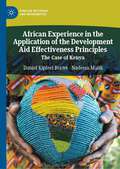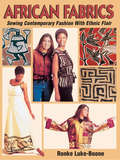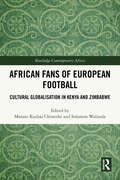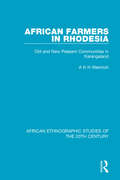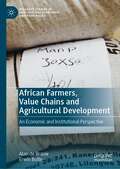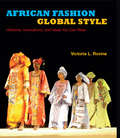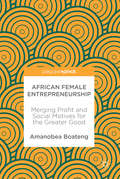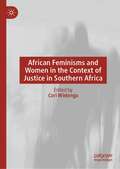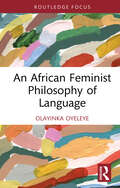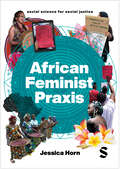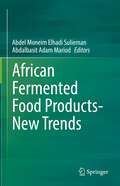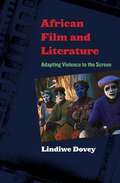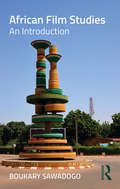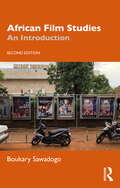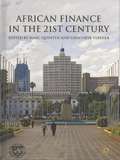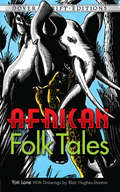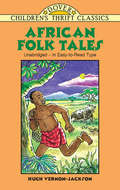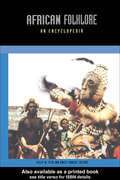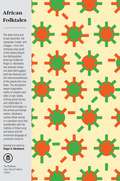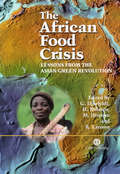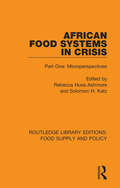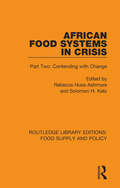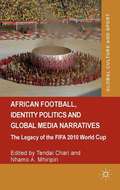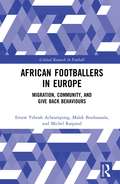- Table View
- List View
African Experience in the Application of the Development Aid Effectiveness Principles: The Case of Kenya (African Histories and Modernities)
by Daniel Kipleel Borter Nadeem MalikThis book analyses the diffusion and implementation of Aid Effectiveness Principles in Kenya’s agricultural sector. Although Aid Effectiveness Principles represent a significant step in aid and development discourse, studies on its implementation remain inadequate, especially in the African context. This book combines the perspectives of the Kenyan government, donor representatives and small-scale farmers. The discussion on Kenya brings in comparative perspectives and, therefore, would have broader relevance to the African region, in general. It highlights a disconnect between the government and farmers concerning the ownership concept, where farmers lack a voice in important policy matters. The book shows that donors have exploited the weaknesses in government responses to interpret The Principles in ways that suit their strategic interests. Consequently, the book argues that the diffusion of Aid Effectiveness Principles has taken the form of symbolic imitation – a form of policy diffusion where the policymakers choose policies for their symbolic value rather than their effectiveness.
African Fabrics: Sewing Contemporary Fashion with Ethnic Flair
by Ronke Luke-BooneCreate style with a touch of the exotic Exciting! Inspiring! African fabrics are vibrant, beautiful, and widely available - and they are perfect for contemporary clothing for men, women, and children and great for home decor. An excellent reference for sewers or anyone who is interested in fabrics, culture, and history, this guide will teach you where to buy fabrics, how to choose the right ones, and the best techniques for sewing them. 14 original projects, including Tote bag Apron Tunic Place mats Shawl Pillows Vest Child's loom Full size patterns for three projects Covers these popular African fabrics Mudcloth Fancy prints Kuba cloth Wax prints Korhogo cloth Kente cloth
African Fans of European Football: Cultural Globalisation in Kenya and Zimbabwe (Routledge Contemporary Africa)
by Manase Kudzai Chiweshe Solomon WaliaulaThis book examines the increasing influence of European football in African societies, considering the processes and significance of being a fan and what this means for the wider globalisation of popular culture.Focussing on fan cultures in Kenya and Zimbabwe, the book argues that instead of manifestations of neo-colonialism, African fandoms of European football are practised in ways that resonate with and help reconstruct and perform the socio-cultural substance of the African communities in question. European football is therefore instrumentalised to help define the identities of the members of the fandom communities and articulate their experience of their reality in their immediate circumstances.This book reflects how the global and local can coalesce in cultural trends such as football fandom. It will interest sports, leisure, popular culture, and social anthropology researchers in Africa and beyond.
African Farmers in Rhodesia: Old and New Peasant Communities in Karangaland
by A K WeinrichOriginally published in 1975 this book analyses the factors making for success and failure in agricultural development among black Zimbabweans during the 20th century. A detailed analysis is given of 2 tribal trust lands, including government policies and administrative control of these areas, voluntary and forced adjustment to land shortage and the economic resources and productivity of peasant cultivators. Settlements under individual land tenure are examined, as are government policies to these, the internal transofrmation of these communities and their economic resources and productivity. There is also a section on irrigation schemes and the reaction of people to irrigation farming. This is an indispensable book in understanding the present-day situation of agriculture in Zimbabwe.
African Farmers, Value Chains and Agricultural Development: An Economic and Institutional Perspective (Palgrave Studies in Agricultural Economics and Food Policy)
by Alan de Brauw Erwin BulteThis book provides a thorough introduction to and examination of agricultural value chains in Sub-Saharan Africa. First, the authors introduce the economic theory of agri-food value chains and value chain governance, focusing on domestic and regional trade in (and consumption of) food crops in a low-income country context. In addition to mainstream and heterodox thinking about value chain development, the book pays attention to political economy considerations. The book also reviews the empirical evidence on value chain development and performance in Africa. It adopts multiple lenses to examine agricultural value chains, zooming out from the micro level (e.g., relational contracting in a context of market imperfections) to the meso level (e.g., distributional implications of various value chain interventions, inclusion of specific social groups) and the macro level (underlying income, population and urbanization trends, volumes and prices, etc.).Furthermore, this book places value chain development in the context of a process the authors refer to as structural transformation 2.0, which refers to a process where production factors (labor, land and capital) move from low-productivity agriculture to high-productivity agriculture. Finally, throughout the book the authors interpret the evidence in light of three important debates: (i) how competitive are rural factor and product markets, and what does this imply for distribution and innovation? (ii) what role do foreign investment and factor proportions play in the development of agri-food value chains in Africa? (iii) what complementary government policies can help facilitate a process of agricultural value chain transformation, towards high-productive activities and enhancing the capacity of value chains to generate employment opportunities and food security for a growing population.
African Fashion, Global Style
by Victoria L. RovineAfrican Fashion, Global Style provides a lively look at fashion, international networks of style, material culture, and the world of African aesthetic expression. Victoria L. Rovine introduces fashion designers whose work reflects African histories and cultures both conceptually and stylistically, and demonstrates that dress styles associated with indigenous cultures may have all the hallmarks of high fashion. Taking readers into the complexities of influence and inspiration manifested through fashion, this book highlights the visually appealing, widely accessible, and highly adaptable styles of African dress that flourish on the global fashion market.
African Female Entrepreneurship: Merging Profit and Social Motives for the Greater Good
by Amanobea BoatengContributing to academic discussions on entrepreneurship and gender in Africa, this book provides coverage of recent trends and an exploration of the evolution of female entrepreneurship over time. This innovative new text, written from an African woman's perspective, fills a gap in the current literature on this topic and places important focus on the role of female entrepreneurship in Africa's development as a continent. Focussing on key issues such as social feminism and the capability approach, the author addresses the possibility of a potential overlap between social entrepreneurship and female entrepreneurship in Africa. Insightful accounts of women from countries such as South Africa, Namibia and Ghana, along with theoretical research into the further development and advancement of female entrepreneurs, make this book an important must-read for those interested in entrepreneurship and gender in Africa.
African Feminisms and Women in the Context of Justice in Southern Africa
by Cori WielengaThis book explores justice ‘on the ground’ in Southern African communities, and in particular the roles that women play in these processes. Justice on the ground is often critiqued for being male-dominated and patriarchal. This volume seeks to unpack and problematize this assumption through the case studies of Namibia, Zimbabwe, Mozambique and South Africa. Contributions focus on the lived experiences of women and the intersections of race, class, culture and the colonial experience that shape their lives. In the rural and peri-urban contexts discussed in this book, justice on the ground is found to be relational. The network of relationships between people and the well-being and health of a community as an integral whole continue to be of central importance as the survival of the community depends on the entire community functioning interdependently. An engagement with African feminisms is helpful in providing a number of lenses, or simply questions, through which to read the case studies. These case studies reveal the complex and organic ways in which women have power and influence in relation to justice on the ground which may not be immediately obvious.
An African Feminist Philosophy of Language (ISSN)
by Olayinka OyeleyeThis book calls for the institution of an African feminist philosophy of language, challenging existing debates and encouraging a move away from the Western gaze.The book begins with an analysis of the philosophical context of African feminism, and a call for the decolonization of epistemological discourse. Oyeleye then goes on to consider how indigenous patriarchies play out in the cultural reality of the Yorùbá in particular, ontologically unpacking the nature of woman as expressed in language, especially in myths and proverbs. Challenging the derogatory language found in proverbs which entrench patriarchal oppression, the author advocates for feminist postproverbials: new proverbs which draw on old traditions but reconstruct the space of woman in a new, egalitarian rhetorical tradition. The author concludes by outlining the conditions necessary for African feminist philosophers to consider language as a decolonizing space which can help to push through the agenda of social change.This book will be an important resource for researchers from across the fields of gender and women studies, feminist philosophy, philosophy of language, cultural studies, and African studies.
African Feminist Praxis: Cartographies of Liberatory Worldmaking (Social Science for Social Justice)
by Jessica Horn"Written in love and fire, African Feminist Praxis is meticulous and visionary." - Dr. Pumla Dineo Gqola, SARChI Chair in African Feminist Imagination, Nelson Mandela University and author of Female Fear Factory So much of the story of African resistance has been told in the masculine, tracing the history of spectacle: great struggles, great speeches, the grand displays of nation building. This book adds to the literature that reverses this, exploring the flesh and breadth of contemporary African feminist politics as articulated across the African continent. It is structured around the key principles of kinship, courage, pleasure, care and memory, and draws on the African feminist academic canon, the "grey literature" of practitioner knowledge and narratives of feminists activists themselves. Through this it evidences the argument that African feminist praxis is fundamentally a politics of proposition, a mode of liberatory worldmaking. The Social Science for Social Justice series challenges the Ivory Tower of academia, providing a platform for academics, journalists, and activists of color to respond to pressing social issues.
African Feminist Praxis: Cartographies of Liberatory Worldmaking (Social Science for Social Justice)
by Jessica Horn"Written in love and fire, African Feminist Praxis is meticulous and visionary." - Dr. Pumla Dineo Gqola, SARChI Chair in African Feminist Imagination, Nelson Mandela University and author of Female Fear Factory So much of the story of African resistance has been told in the masculine, tracing the history of spectacle: great struggles, great speeches, the grand displays of nation building. This book adds to the literature that reverses this, exploring the flesh and breadth of contemporary African feminist politics as articulated across the African continent. It is structured around the key principles of kinship, courage, pleasure, care and memory, and draws on the African feminist academic canon, the "grey literature" of practitioner knowledge and narratives of feminists activists themselves. Through this it evidences the argument that African feminist praxis is fundamentally a politics of proposition, a mode of liberatory worldmaking. The Social Science for Social Justice series challenges the Ivory Tower of academia, providing a platform for academics, journalists, and activists of color to respond to pressing social issues.
African Fermented Food Products- New Trends
by Abdalbasit Adam Mariod Abdel Moneim Elhadi SuliemanFermented foods play a major role in human nutrition and health, given the addition of flavor, improvement of texture, preservation against spoilage, and ease of digestion due to the fermentation process. This book provides information about the chemistry and bioactive compounds of African fermented food products, including their nutritional value and minor constituents. Chapters cover a wide range of topics, from the microorganisms involved in spontaneous fermentation to food safety considerations and quality assessment. The text can be used as a practical manual to better understand the nutritional and medicinal uses of various African fermented foods, as well as prepare recipes and product labels.
African Film and Literature: Adapting Violence to the Screen (Film and Culture Series)
by Lindiwe DoveyAnalyzing a range of South African and West African films inspired by African and non-African literature, Lindiwe Dovey identifies a specific trend in contemporary African filmmaking-one in which filmmakers are using the embodied audiovisual medium of film to offer a critique of physical and psychological violence. Against a detailed history of the medium's savage introduction and exploitation by colonial powers in two very different African contexts, Dovey examines the complex ways in which African filmmakers are preserving, mediating, and critiquing their own cultures while seeking a united vision of the future. More than merely representing socio-cultural realities in Africa, these films engage with issues of colonialism and postcolonialism, "updating" both the history and the literature they adapt to address contemporary audiences in Africa and elsewhere. Through this deliberate and radical re-historicization of texts and realities, Dovey argues that African filmmakers have developed a method of filmmaking that is altogether distinct from European and American forms of adaptation.
African Film Studies: An Introduction
by Boukary Sawadogo<p>African Film Studies: An Introduction is an accessible and authoritative textbook on African cinema as a field of study. The book provides a succinct and comprehensive study of the history, aesthetics, and theory of sub-Saharan African cinematic productions that is grounded in the field of film studies instead of textual interpretations from other disciplines. <p>Bringing African cinema out of the margins into the discipline of mainstream film studies and showcasing the diverse cinematic expressions of the continent, the book covers: <p> <li>Overview of African cinema(s): Questions our assumptions about the continent’s cinematic productions and defines the characteristics of African cinema across linguistic, geographic, and filmic divides. <li>History of African and African-American cinema: Spans the history of film in Africa from colonial import and ‘appropriation of the gaze’ to the quest for individuality. It also establishes parallels in the historical development of black African cinema and African-American cinema. <li>Aesthetics: Introduces new research on previously unexplored aesthetic dimensions such as cinematography, animation, and film music. <li>Theoretical Approaches: Addresses a number of theoretical approaches and critical frameworks developed by scholars in the study of African cinema <p> <p>All chapters include case studies, suggestions for further reading, and screening lists to deepen the reader’s knowledge with no prior knowledge of African cinema required. Students, teachers, and general film enthusiasts would all benefit from this accessible and engaging book.</p>
African Film Studies: An Introduction
by Boukary SawadogoAfrican Film Studies is an accessible and engaging introduction to African cinemas, showcasing the diverse cinematic expressions across the continent. Bringing African cinemas out of the margins and into mainstream film studies, the book provides a succinct overview of the history, aesthetics, and theory of sub-Saharan African cinematic productions. Updated throughout, this new edition includes new chapters on Nollywood, Ethiopian cinema, Streaming, and the rise of televisual series, which serve to complement the book’s main themes: • Overview of African cinema(s): Questions assumptions and defines the characteristics of African cinemas across linguistic, geographic, and filmic divides. • History of African cinemas: Spans the history of film in Africa from colonial import and ‘appropriation of the gaze’, the rise of Nollywood and local TV series to streaming, as well as building connections with the development of African American cinema. • Aesthetics: Introduces new research on previously under-explored aesthetic dimensions such as cinematography, animation, and film music. • Theoretical Approaches: Addresses a number of theoretical approaches and critical frameworks developed by scholars in the study of African cinemas. • Traditions and practices in African screen media: Features Ethiopian cinema, Nollywood, Local Televisual Series in Burkina Faso and South Africa, and the Streaming rush for Africa. All chapters include case studies, suggestions for further reading, and screening lists to deepen the reader’s knowledge, with no prior knowledge of African cinemas required. Students, teachers, and general film enthusiasts would all benefit from this accessible and engaging book.
African Finance in the 21st Century
by Marc Quintyn Geneviève VerdierWith contributions by experts from official agencies in Africa, international financial institutions, the private sector, and academia, this book focuses on financial sector development in Sub-Saharan Africa and how institutions can play a more active role in economic development.
African Folk Tales (Dover Thrift Editions)
by Yoti Lane Blair Hughes-StantonA delight for readers and listeners of all ages, these 25 traditional tales from West Africa were originally accompanied by music and dance. The stories' drama and folk wisdom shine through in these captivating retellings, which are illustrated by evocative woodcut illustrations. Age-old fables explain why the leopard has no friends, how wild dogs became domesticated, and why pigs dig. Adventure stories recount a prince's quest for an ancient ivory horn and the struggles of two sisters, separated by slavery, to reunite. All of the stories are populated by memorable characters such as a greedy monkey and ambitious ants, a pair of crickets forced to sing for their supper, a couple of fishermen who compete for a bride, and the Man-in-the-Moon and his wife.
African Folk Tales
by Hugh Vernon-Jackson Yuko GreenThis exciting collection of traditional African folk tales introduces you to a host of interesting people and unusual animals. Eighteen authentic fables, recorded as they were told by tribal members of Nigerian and other cultures, range from the imaginative "Story of a Farmer and Four Hyenas" to an entertaining account of "The Man with Seven Dogs."In "The Magic Crocodile," you'll meet a reptile with very strange powers, while "The Boy in the Drum" teaches a valuable lesson in the importance of obeying one's parents. In "The Hare and the Crownbird," a fine, feathered friend is rewarded for its acts of kindness. You'll also learn why a ram has a large head and a tortoise a small one in "The Greedy but Cunning Tortoise"; and in "A She-Goat and Her Children," you'll discover how a clever animal managed to provide food for her children.Set in large, easy-to-read type and enhanced with Yuko Green's 19 lively illustrations, this collection of time-honored folk tales will delight readers of all ages.
African Folklore: An Encyclopedia
by Philip M. Peek Kwesi YankahWritten by an international team of experts, this is the first work of its kind to offer comprehensive coverage of folklore throughout the African continent. Over 300 entries provide in-depth examinations of individual African countries, ethnic groups, religious practices, artistic genres, and numerous other concepts related to folklore. Featuring original field photographs, a comprehensive index, and thorough cross-references, African Folklore: An Encyclopedia is an indispensable resource for any library's folklore or African studies collection. Also includes seven maps.
African Folktales (The Pantheon Fairy Tale and Folklore Library)
by Roger AbrahamsNearly 100 stories from over 40 tribe-related myths of creation, tales of epic deeds, ghost stories and tales set in both the animal and human realms.Part of the Pantheon Fairy Tale and Folklore LibraryFrom the Trade Paperback edition.
The African Food Crisis: Lessons from the Asian Green Revolution
by Goran Djurfeldt Magnus Jirstroml Rolf Larsson Hans HolmenThe goal of the research project resulting in this monograph was the systematic comparison between Asian agricultural development during the "Green Revolution" and the current agricultural situation in sub-Saharan Africa. The editors (from Sweden's U. of Lund and Link ping U.) include 14 papers that present and analyze macro- level data about national agricultural trends before, during, and after Structural Adjustment Programs and household-level survey data for comparison of countries. The analysis is geared towards investigating agro ecological, demographic, and technological obstacles to African agricultural development; the possible contributions of African smallholders to food security; the likely impact of market integration of small-scale integration on economic and ecological crisis; the inadequacy of export-oriented policies to meeting the demands of food security; and the relevance of the Asian model for Africa. Distributed in the US by Oxford U. Press. Annotation ©2005 Book News, Inc., Portland, OR (book news.com)
African Food Systems in Crisis: Part One: Microperspectives (Routledge Library Editions: Food Supply and Policy)
by Rebecca Huss-Ashmore Solomon H. KatzOriginally published in 1990. Produced by the Task Force on African Famine of the American Anthropological Association, this is the first of a multi-part project dealing with the long-term and ongoing food crisis in Africa primarily at the level of local production-the microperspective. It offers a series of anthropological and ecological views on the cause of the current problem and on coping strategies used by both indigenous people and developmental planners. The three sections of this volume review current explanations for food problems in Africa, focusing mainly on production and consumption at the household level; they offer a number of perspectives on the environmental, historical, political, and economic contexts for food stress, and include a series of case studies showing the ways in which Africans have responded to the threat of drought and hunger. The extent of research and the degree of scholarship involved in the production of this volume recommend it to all persons concerned with this ultimately global dilemma, particularly those involved in planning and relief efforts.
African Food Systems in Crisis: Part Two: Contending with Change (Routledge Library Editions: Food Supply and Policy)
by Rebecca Huss-Ashmore Solomon H. KatzOriginally published in 1991. Commissioned by the Task Force on African Famine of the American Anthropological Association, this the second part of a project examining the causes of food system failure in Africa and the effects of attempts to remedy the situation. It evaluates the often-retrogressive results of foreign aid to African nations and offers an anthropological perspective on how to reverse this trend. The contributors emphasize integrating all development programs with the regional customs and traditions already in place that have thus far allowed its people to cope with food and water shortages. In the past, various strategies have failed due to misunderstandings and incorrect assumptions concerning gender roles, food consumption habits, social relations, kinship networks, land use and government function. New understanding of the culture must be complemented with multifaceted programs incorporating education, a concern for grass-roots opinion and control, attention to production and consumption patterns, and various forms of broad-spectrum integrated development. The uniqueness research is recommended for all who are concerned about worldwide malnutrition and those who understand the need to recognize local traditions as resources that must be included in any successful development program.
African Football, Identity Politics and Global Media Narratives
by Tendai Chari Nhamo A. MhiripiriThis edited volume addresses key debates around African football, identity construction, fan cultures, and both African and global media narratives. Using the 2010 FIFA World Cup in South Africa as a lens, it explores how football in Africa is intimately bound up with deeper social, cultural and political currents.
African Footballers in Europe: Migration, Community, and Give Back Behaviours (Critical Research in Football)
by Ernest Yeboah Acheampong Malek Bouhaouala Michel RaspaudAfrican Footballers in Europe traces the social and economic evolution of African football and examines the strategies and resources that players mobilise in their migrations, with a particular focus on ‘Give Back Behaviours’ (how players contribute to their countries or communities of origin). It shines new light on contemporary migrations, labour markets in sport, and processes of development in Africa. Using a multidisciplinary approach and Weberian methodology to analyse players’ 'Give Back' behaviour, the book highlights the complex rationale behind this behaviour, based on a combination of social, cultural, and economic elements. It features interviews with former and current African professional players, providing a vivid picture of the role of communities in players’ migration projects, the allure of the European football market, and investment initiatives that can contribute to local and regional development. This is a vital read for academics, researchers, and students of sport sciences, sociology of sport, sport management, sociology, geography, political sciences, management, sociology of Africa, migration studies, sociology of the labour market, and economic sociology. It is also an important resource for professional organisations, NGOs, football agents, football administrators, federations, confederations, and governments.
